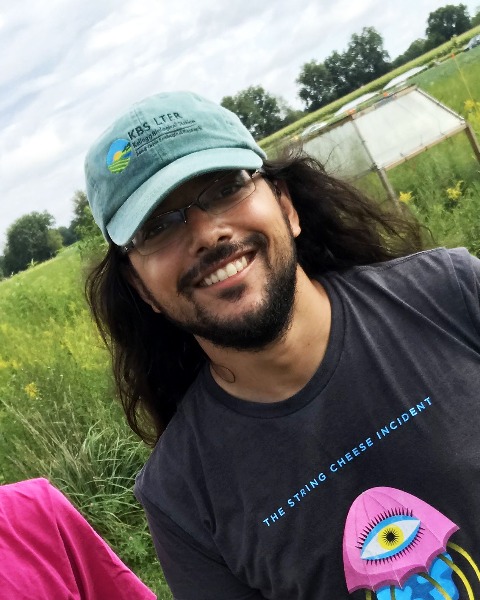Back
Organized Oral Session
Session: Exploring Public Engagement as a Transformative Force in Ecological Research
OOS 20-1 - Strategic engagement planning and DEI at the Kellogg Biological Station Long Term Ecological Research site
Tuesday, August 16, 2022
3:30 PM – 3:45 PM EDT
Location: 520D

Nameer R. Baker
KBS-LTER Science Coordinator
Kellogg Biological Station LTER, Michigan State University, Michigan, United States- ES
Elizabeth Schultheis
Michigan State University
- JD
Julie Doll
Michigan Agriculture Advancement
Presenting Author(s)
Co-author(s)
Background/Question/Methods
In order to provide direction to our efforts to enhance the broader impacts of the research being performed on-site, the KBS-LTER engaged in a months-long strategic planning process to identify scientific foci and outreach initiatives that could most effectively be harnessed towards common long-term broader impacts goals. Through a process of iterative interviews with key station personnel to determine strengths, priorities, and weaknesses, outside consultants helped us develop common visionary and broader impacts goals that were shared with the LTER’s executive committee. These goals were then used to develop prospective “pillars” of a re-oriented broader impacts program. This was done through a series of individual and group discussions within the executive committee, where the shared ideas that most excited the group were identified and linked to capabilities on-site that would enable us to pursue them effectively.
Results/Conclusions
Through this strategic planning process, KBS-LTER was able to identify and develop five pillars for their broader impacts program – two focused on leveraging the scientific research done at the station that is most applicable to the grand challenges facing society (“Farmscapes for Biodiversity” and “Carbon and Croplands”), two focused on leveraging successful education and outreach initiatives developed at KBS in the wider community (“Data Nuggets” and the “K-12 Partnership”), and a fifth, all-encompassing initiative focused on using our position of prestige and scientific opportunity to increase the accessibility of ecology, evolutionary biology, and sociology to those from historically-excluded backgrounds (“Ecology for All”). These initiatives a) fit KBS’ profile as a leader in research on the effects of biodiversity on ecosystem services in managed landscapes and on the formation and stabilization of soil organic matter, b) target local school districts as well as companion field stations as venues where our education and outreach programs can be most effective, and c) ensure that we always strive to maintain an ethos of inclusivity in tandem with excellence in scientific research.
In order to provide direction to our efforts to enhance the broader impacts of the research being performed on-site, the KBS-LTER engaged in a months-long strategic planning process to identify scientific foci and outreach initiatives that could most effectively be harnessed towards common long-term broader impacts goals. Through a process of iterative interviews with key station personnel to determine strengths, priorities, and weaknesses, outside consultants helped us develop common visionary and broader impacts goals that were shared with the LTER’s executive committee. These goals were then used to develop prospective “pillars” of a re-oriented broader impacts program. This was done through a series of individual and group discussions within the executive committee, where the shared ideas that most excited the group were identified and linked to capabilities on-site that would enable us to pursue them effectively.
Results/Conclusions
Through this strategic planning process, KBS-LTER was able to identify and develop five pillars for their broader impacts program – two focused on leveraging the scientific research done at the station that is most applicable to the grand challenges facing society (“Farmscapes for Biodiversity” and “Carbon and Croplands”), two focused on leveraging successful education and outreach initiatives developed at KBS in the wider community (“Data Nuggets” and the “K-12 Partnership”), and a fifth, all-encompassing initiative focused on using our position of prestige and scientific opportunity to increase the accessibility of ecology, evolutionary biology, and sociology to those from historically-excluded backgrounds (“Ecology for All”). These initiatives a) fit KBS’ profile as a leader in research on the effects of biodiversity on ecosystem services in managed landscapes and on the formation and stabilization of soil organic matter, b) target local school districts as well as companion field stations as venues where our education and outreach programs can be most effective, and c) ensure that we always strive to maintain an ethos of inclusivity in tandem with excellence in scientific research.
